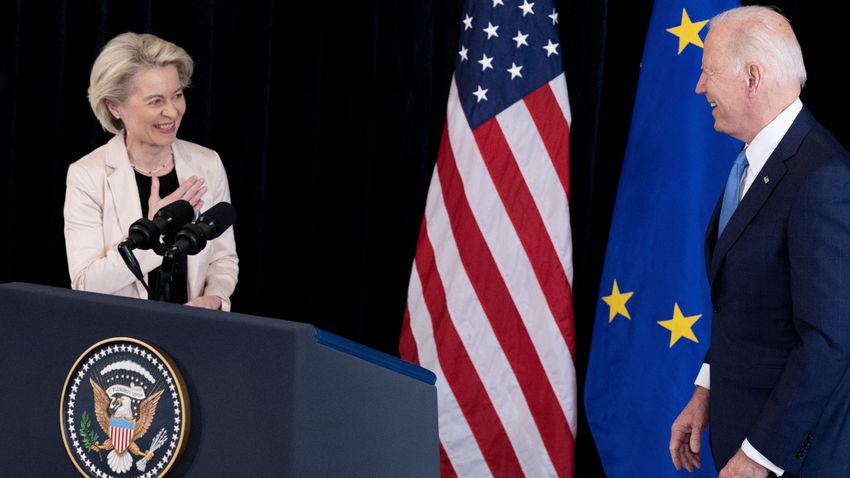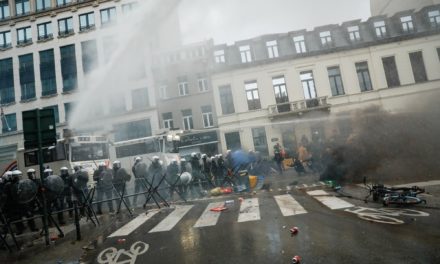While the USA slips that it has always wanted to seize the entire sanctioned Russian assets, Ursula von der Leyen takes an unexpected militaristic turn and admits that they want to contribute to the purchase of weapons rather than to the reconstruction of Ukraine.
Tensions are starting to develop between the members of the G7 and the United States and the European Union in connection with the confiscation of Russian locked central bank assets. US Treasury Secretary Janet Yellen insists on the idea that all of Russia's state assets, about 250 billion, should be confiscated and given to Ukraine. His enthusiasm is not at all shared by those states (especially France, Italy and Germany) that agree with the European Central Bank's repeated warnings:
such a move could completely undermine financial confidence in Europe and the euro, resulting in currency depreciation.
Europe's possible decision is much riskier because the Russian money lying in the United States is dwarfed by the more than 200 billion euros, which was frozen by the Belgian-based asset manager Euroclear in the first rounds of sanctions. (In other words, the Americans are just teaching without stakes.) The other day, the head of the company also called for calm and asked the leaders to forget the impossible idea of confiscating the frozen assets to rebuild a country that is still very much at war. stands
Euroclear would rather be an enthusiastic (more enthusiastic) partner in the idea of using the amount of profit from the frozen assets to help Ukraine, it is true that it is "only" 3-4 billion euros per year, but things can work on a small-to-large basis, and moreover the risk is also significantly smaller than simply taking the sovereign property of another state, contrary to all customary and international legal norms.
Washington is increasingly violent
Politico 's report, there is a constant back-and-forth in the matter: the idea of using only the interest on frozen assets is warmly welcomed by the United States, and then Janet Yellen announces:
this will be a good first step, but the goal must always be to confiscate all Russian state assets and transfer them to Ukraine.
Washington doesn't listen to the worried voices, he started his whole machinery to achieve his goal. There is a very compelling reason for the haste and aggressive demands. Since last fall, the Republican-dominated Congress has blocked the $60 billion in aid to be sent to Ukraine, and tied its sending to a drastic and immediate solution to the apocalyptic situation on the Mexican border due to illegal migration - after the Democrats did not agree to their terms,
the Ukrainian money will remain where it is, and according to the signs, it is even conceivable that it will not reach the recipient at all.
In other words, the United States does what it does best: if it can't solve the problem, it calls on someone else to solve it for it.
In this case, it would be the European Union, but Brussels is noticeably cautious in this matter and, despite all prior commitments, is not willing to accept an asset confiscation without any legal basis for the time being. His concern is legitimate: in addition to the fact that it has never happened before in history and international law to oblige a country still at war to pay reparations, the Kremlin articulately stated:
if the West dares to touch its money, Moscow will do the same and confiscate Western assets of similar magnitude.
Washington vehemently denies that his idea of total confiscation coincided with the congressional gridlock. That's exactly how it happened.
As long as the money spigots to Ukraine were open, the United States did not even think of proposing confiscation of the entire amount.
However, a senior US government official (speaking anonymously, of course) rejected the suggestion to Politico, literally saying that this was the plan from the beginning, "we always envisioned this as the only realistic option for rebuilding Ukraine."
But in this form it is a net lie. The idea of confiscating Russian assets and sending them to Ukraine was raised by Zelensky himself back in 2022. The financial world was left speechless in shock, as were the finance ministers of the sanctioning countries. Janet Yellen herself rejected the unprecedented, enormous risk proposition, who explained several times:
"It is quite natural that someone expects Russia to cover the costs of reconstruction after the destruction of Ukraine, but the confiscation of Russian central bank assets is not legally possible in the United States."
So there is no question that this was always the plan of the United States, just as there is no question of trying to zero out the Russian state account already during the war. Janet Yellen's fresh belligerence is simply due to the fact that the White House's checks have been cashed, but she is still trying to finance the war - with other people's money.
Europe is loud
The European Union is also in complete confusion. The fault lines between the member states are also visible in the matter of frozen assets. What is certain: at the moment (thanks to the effective resistance of Germany and France, of course) Brussels is not attempting a complete confiscation. The latest idea is to keep the money of the Central Bank of Moscow as collateral for the loan, and then use it sometime after the war, if the Kremlin refuses to support the reconstruction of Ukraine. (Until then, they will also figure out the legal background for it.)
There is still some friction between member states about spending the €3-4 billion of annual profits from the frozen money, but it is still one of the more acceptable ideas. After quite a lot of people raised the question of what Ukraine will do with so little money after the war, when the reconstruction costs are already close to 500 billion dollars in the calculations, the President of the European Commission pulled a surprising one, which according to the indications is not even possible yet he didn't discuss it with anyone, he just threw it in the common to see if something would come out of it.
Ursula von der Leyen said at the end of February:
now is the time for dialogue about using the profits from frozen Russian assets to jointly purchase military equipment for Ukraine.
In other words, the loud and table-beating communication about the reconstruction of Ukraine suddenly became nothing, the battle cry "make the aggressor pay for the destruction" was silenced.
All of this has now become an arms purchase project, with which the European Union (if it takes place) creates an even bigger pile of rubble from Ukraine instead of construction, even though there is practically nothing left to destroy in half of the country.
In addition, the Brussels leader spit out the self-sanctified principle:
the Commission has previously indicated on several occasions that the fund created from the profits of the frozen assets will not be able to be used for the purchase of weapons. It will not be easy, there are several member states that will not agree to the idea of turning Russian money back into the war itself.
As for American will: if Congress continues to be stubborn, Washington will increasingly aggressively demand that Brussels comply. As for Brussels: it has now become obvious that the belief in a Ukrainian victory is based on lies, even in open communication. In any case, the idea of confiscating and military use of Russian locked assets reflects the total bewilderment and desperation of both parties.
Featured image: MTI/EPA












